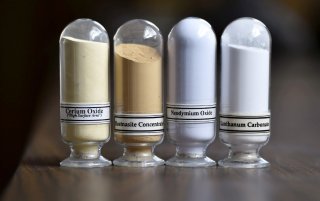Will China Seek to Exploit Its Rare-Earth Dominance?
China has many wondering: could Beijing use its influence over the rare earths supply chain as a form of geopolitical leverage?
The question then becomes is who will benefit from this and at what cost?
From the perspective of the United States, in the event of a confrontation with China, it would be highly likely that China would use its dominance in rare earths to its geostrategic advantage. With the current high reliance on China’s supply chain for rare earths, Western democratic countries would suffer catastrophic consequences in their economies and defense in such an event. For that reason, the rare earth supply chain is considered “America’s critical strategic vulnerability,” and the United States must lead in building a Western supply chain to counter China’s potential threat.
From China’s perspective, given its heavy reliance on the global supply chains of semiconductors and other technologies critical to its digital ambitions, it would not be likely to use its “wild card” of rare earths, unless strategically cornered. As suggested in Xi Jinping’s recent speeches at the G20, China intends to continue to open up and maintain the status quo of the highly interdependent global value chains, from which it has benefited greatly.
From a global perspective, one common issue the world is facing is promoting clean energy to fight climate change, and rare earths are critical in wind turbines and solar panels, as well as batteries used in EVs. Without rare earths, none of those clean energy solutions would be possible and the fight against climate change would be fruitless. As argued in a report by the International Energy Agency, various critical minerals, especially rare earths, play a vital role in the clean energy transition, which also reflects an EU perspective. To solve the mismatch between the world’s climate ambitions and the vulnerability of the rare earth supply chain, a global effort, including R&D and investment in advancing technologies to recycle critical minerals, is key.
Returning to Kim Beazley’s concerns over rare earths, Australia holds the fifth-largest rare-earth reserves in the world and is the fourth-largest exporter of rare earths. It may be wise for Australia to align with the EU to take a global perspective on managing rare earths—joining the global effort in R&D and investment for recycling rare earths and dealing with climate change—rather than being an “out-and-out pawn” of the United States.
Dr. Marina Yue Zhang is an associate professor of research at the Australia-China Relations Institute, University of Technology Sydney (UTS:ACRI). She is the author of three books, including Demystifying China's Innovation Machine: Chaotic Order, co-authored with Mark Dodgson and David Gann.
Image: Reuters.

